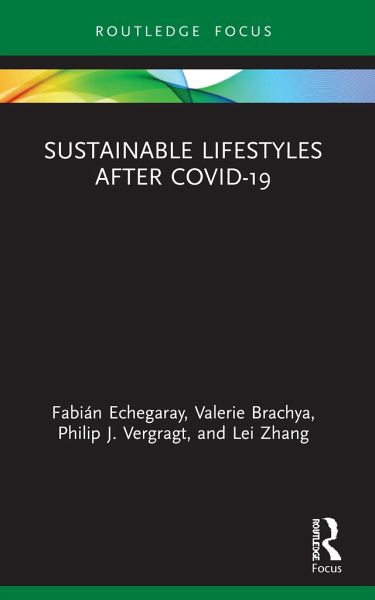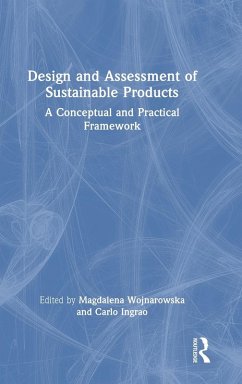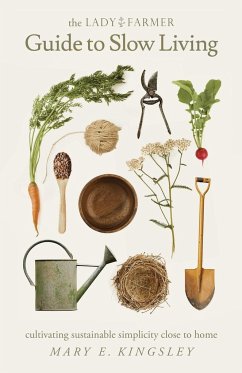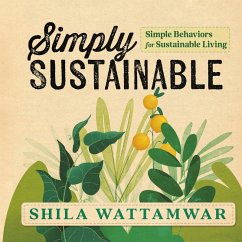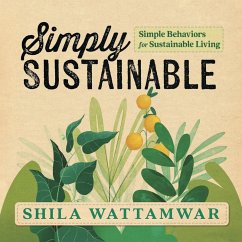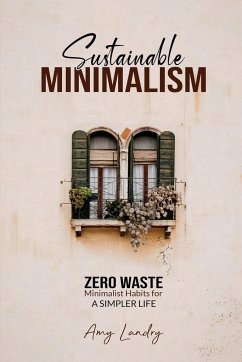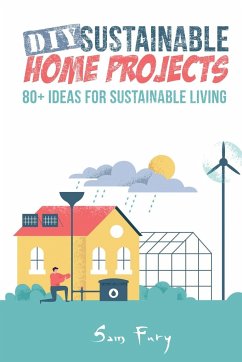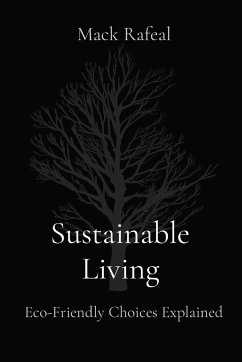Sustainable Lifestyles after Covid-19
Versandkostenfrei!
Versandfertig in 1-2 Wochen
Weitere Ausgaben:

PAYBACK Punkte
13 °P sammeln!





This book takes an in-depth look at Covid-19-generated societal trends and develops scenarios for possible future directions of urban lifestyles. It will be of great interest to students, scholars and professionals researching and working in the areas of sustainable consumption, urban and land use planning and public health.
Fabián Echegaray is the Founder and Managing Director of Market Analysis, Florianópolis, SC, Brazil. Valerie Brachya is Senior Associate Researcher at The Jerusalem Institute for Policy Research and Lecturer in Sustainability Policy at the Porter School of the Environment and Earth Sciences, Tel Aviv University, Israel. Philip J. Vergragt is Emeritus Professor at TU Delft, The Netherlands; Research Professor at Clark University, USA; and a co-founder of SCORAI. Lei Zhang is Associate Professor at the School of Environment and Natural Resources at Renmin University of China, Beijing, China.
Produktdetails
- Verlag: Routledge
- Seitenzahl: 152
- Erscheinungstermin: 9. Januar 2023
- Englisch
- Abmessung: 216mm x 140mm x 8mm
- Gewicht: 201g
- ISBN-13: 9780367754112
- ISBN-10: 0367754118
- Artikelnr.: 69893165
Herstellerkennzeichnung
Libri GmbH
Europaallee 1
36244 Bad Hersfeld
gpsr@libri.de
"The authors identify several major trends that arose during the pandemic, including digitalization, passive citizenship, localization and shifts in consumption patterns. This thoughtful discussion should be the basis for any long-term academic and policy discourse regarding the question on where we should go once the pandemic subsides." -- Eran Feitelson, Leon J and Alyce K Ell Chair in Environmental Studies, The Hebrew University of Jerusalem, Israel
"The world is rapidly changing, calling for a change in our assumptions, lifestyles, and the way we consume. This book brings together the knowledge of well-renowned scholars and practitioners from different parts of the world, and presents a global overview
"The world is rapidly changing, calling for a change in our assumptions, lifestyles, and the way we consume. This book brings together the knowledge of well-renowned scholars and practitioners from different parts of the world, and presents a global overview
Mehr anzeigen
of our current situation. It offers tentative solutions and identifies the importance of personal engagement for addressing the key causes in favor of both the human race and the planet. It is a must-read for those who want to be part of this transformation" -- Marcus Nakagawa, São Paulo, Brazil; Founder of ABRAPS (Brazilian Association of Sustainability Consultants and Professionals), TEDx Talk speaker and marketing sciences professor
"This is a timely and fascinating book written during the pandemic. Many of the impacts of Covid-19 upon human societies have yet to be discerned, but some have become clear. The authors of this book have clearly demonstrated the accelerated processes caused by the pandemic, i.e., digitalization, localization and community connectivity, mindful consumption, and sharing and counteracting waste. The book is thoughtful and witty, full of insights and inspirations. It is one of the first remarkable academic responses to the effects brought about by Covid-19, which will certainly contribute to deepening our understanding of the pandemic's social and cultural impacts." -- Ning Wang, Professor of Department of Sociology and Social Work, School of Sociology & Anthropology, Sun Yat-sen University, Guangzhou, China
"The impact of Covid-19 is a central concern to futures-oriented thinkers and actors. This book, written by a diverse community of scholars across the world, offers a very early, but comprehensive and thoughtful, glimpse of what these might be, organized to be accessible and useful to policy makers and academics." -- John R. Ehrenfeld, Author: The Right Way to Flourish: Reconnecting with the Real World (MIT, retired)
"This book, written in the midst of the pandemic, provides interesting analyses on trends and scenarios, and lays the ground for more in-depth research on how to ensure that some of the changes will last, how to turn our leaders into responsible managers (there is none so far), how to lay long lasting foundations for a transition to responsible consumption and production, and sustainable lifestyles, wisely using public funds for long term objectives such as climate change and sustainability, and not just in emergencies of wars and pandemics. Beyond stimulating dialogues, it is hoped that this book will stimulate joint action for a global response." -- Arab Hoballah, Team Leader, Switch-Asia SCP Facility, Ex-Chief Sustainable Consumption and Production, UN Environmental Program
"This book is a compelling dive into the implications of the unfolding coronavirus pandemic and an exploration of its long-term effects on society and our lifestyles. In tracing these patterns across several countries, the authors note the striking similarities in the impacts on our daily lives including from an increasingly virtual world. They reveal conflicting evidence that these trends are leading to more sustainability; however, the authors conclude that there is a key role for policymakers in enabling a transition that supports lifestyles grounded in health, justice, and planetary and community wellbeing." -- Vanessa Timmer, Executive Director, OneEarth, Vancouver, Canada; Senior Research Fellow, Utrecht University, The Netherlands
"This is a timely and fascinating book written during the pandemic. Many of the impacts of Covid-19 upon human societies have yet to be discerned, but some have become clear. The authors of this book have clearly demonstrated the accelerated processes caused by the pandemic, i.e., digitalization, localization and community connectivity, mindful consumption, and sharing and counteracting waste. The book is thoughtful and witty, full of insights and inspirations. It is one of the first remarkable academic responses to the effects brought about by Covid-19, which will certainly contribute to deepening our understanding of the pandemic's social and cultural impacts." -- Ning Wang, Professor of Department of Sociology and Social Work, School of Sociology & Anthropology, Sun Yat-sen University, Guangzhou, China
"The impact of Covid-19 is a central concern to futures-oriented thinkers and actors. This book, written by a diverse community of scholars across the world, offers a very early, but comprehensive and thoughtful, glimpse of what these might be, organized to be accessible and useful to policy makers and academics." -- John R. Ehrenfeld, Author: The Right Way to Flourish: Reconnecting with the Real World (MIT, retired)
"This book, written in the midst of the pandemic, provides interesting analyses on trends and scenarios, and lays the ground for more in-depth research on how to ensure that some of the changes will last, how to turn our leaders into responsible managers (there is none so far), how to lay long lasting foundations for a transition to responsible consumption and production, and sustainable lifestyles, wisely using public funds for long term objectives such as climate change and sustainability, and not just in emergencies of wars and pandemics. Beyond stimulating dialogues, it is hoped that this book will stimulate joint action for a global response." -- Arab Hoballah, Team Leader, Switch-Asia SCP Facility, Ex-Chief Sustainable Consumption and Production, UN Environmental Program
"This book is a compelling dive into the implications of the unfolding coronavirus pandemic and an exploration of its long-term effects on society and our lifestyles. In tracing these patterns across several countries, the authors note the striking similarities in the impacts on our daily lives including from an increasingly virtual world. They reveal conflicting evidence that these trends are leading to more sustainability; however, the authors conclude that there is a key role for policymakers in enabling a transition that supports lifestyles grounded in health, justice, and planetary and community wellbeing." -- Vanessa Timmer, Executive Director, OneEarth, Vancouver, Canada; Senior Research Fellow, Utrecht University, The Netherlands
Schließen
Für dieses Produkt wurde noch keine Bewertung abgegeben. Wir würden uns sehr freuen, wenn du die erste Bewertung schreibst!
Eine Bewertung schreiben
Eine Bewertung schreiben
Andere Kunden interessierten sich für




